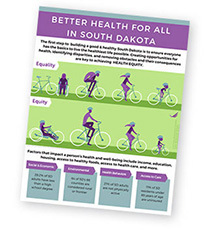
Achieving health equity in all communities has been identified as a guiding principle for the Department of Health’s 2020-2025 Strategic Plan. This webpage was developed to provide a central location for health equity and cultural competency information and resources for department employees and partners.
Build Organizational Capacity
Organizations can engage in practices that influence their impact on health equity. Practices such as staff training, resource distribution, and staffing decisions impact public health.
Community Engagement
Involve community members in health initiatives to foster relationships, improve assessment efforts, build capacity to positively affect the community, and enhance sustainability.
Establish & Foster Partnerships
Engage a diverse sector of partners to collectively achieve equitable outcomes by leveraging diverse skills and expertise.
Understand Health Equity
Understand inequities that exist to establish baselines, monitor trends over time, inform partners where to focus resources, and ensure strategies address the needs of populations experiencing health inequities.
Health Equity-Focused Evidence-Based Strategies
Ensure strategies have a deliberate focus on health equity and include supportive activities to address barriers or unintended outcomes underserved populations may face.
Evaluation
Focus on health equity in evaluation efforts and use culturally appropriate tools and methodologies. Health equity-oriented evaluation can reveal trends in health inequities.
Think Cultural Health
U.S. Department of Health and Human Services
Note: You must log in or register to take this continuing education course
Continuing education for health care administrators and providers; disaster and emergency personnel; nurses and social workers; oral health professionals; and physicians, nurse practitioners, and physician assistants
Moving to Institutional Equity: A Tool to Address Racial Equity for Public Health Practitioners
National Association of Chronic Disease Directors (NACDD) Health Equity Council
This health equity toolkit has been created by the Institutional Equity Committee, a subgroup of the NACDD Health Equity Council, to help identify biased practices and policies. It is being piloted in 9 states.
Roots of Health Inequity
The Roots of Health Inequity is an online learning collaborative. The site offers a starting place for those who want to address systemic differences in health and wellness that are actionable, unfair, and unjust. As a participant in the learning collaborative, you will have a chance to explore concepts and strategies by working through five critical questions.
Achieving Health Equity
This course presents education on how to identify and eliminate health disparities in your organization. It will help your organization prioritize the elimination of disparities as a cross-cutting initiative to improve the quality of care for the individuals and families in your community.
Poverty Simulation: SPENT Training Challenge
SPENT helps people understand the challenges and trade-offs faced by individuals with low socio-economic status.
National Standards for Culturally and Linguistically Appropriate Services in Health Care
U.S. Department of Health and Human Services (HHS)
Rationale and Benefits
Organizations and individuals are at various levels of awareness, knowledge, and skill acquisition along the cultural competency continuum. Completing self-assessments offers many benefits, including monitoring how effectively you are addressing the needs and preferences of culturally/linguistically diverse groups, improving family/client utilization of services, and individual strengths and areas for growth. Self-assessments are a tool, not a test, and should be used to help you consider your own skills, knowledge, and awareness in your interactions with others. https://nccc.georgetown.edu/assessments/rationale.php
Test your cultural competency
Additional Resources
- HHS: Think Cultural Health
- NACDD: Health Equity Resources/Tools
- ASTHO: Health Equity & Social Determinants of Health
South Dakota Resources:
The SHA and SHIP serve as a strategic planning guide for the SD DOH and the many other statewide partners and stakeholders who share in the vision of Every South Dakotan Healthy and Strong. They represent the Department of Health’s commitment to addressing immediate health challenges while laying a strong foundation for long-term health equity and resilience.

